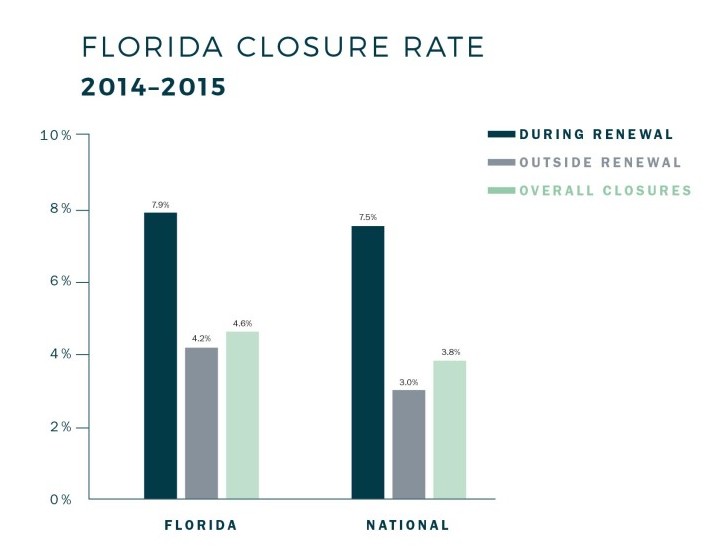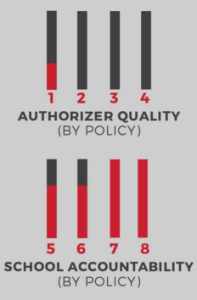Florida's charter school laws continue to get middling rankings from the National Association of Charter School Authorizers. The state's rating remains unchanged in the group's latest national report, leaving it tied with Arizona for the 18th-best charter school oversight policy in the country.
The state's executive branch is trying to tackle some of the issues raised in the third edition of the annual report, which came out this week.
In a nutshell, Florida gets pretty good marks for charter school accountability. Districts are required to keep track of charters' performance, and schools can lose their contracts if they don't meet academic goals. The lowest performers — those that earn consecutive F's through the state grading system — can be shut down automatically.
But the state falls short when it comes to holding districts accountable for the charters they oversee. Local school boards sponsor all but a handful of the state's more than 650 charter schools.
There are several issues here.

Florida charter schools were more likely to close, and more likely to close outside a normal contract renewal period, than the national average. Source: National Association of Charter School Authorizers, "State of Charter School Authorizing".
Last school year, Florida charter schools were more likely to close, and more likely to close early, than the national average.
Some Florida school districts are exemplars for charter school oversight, and have almost all of the 12 "essential practices" identified by the National Association for Charter School Authorizers (NACSA) in place.
But others, typically smaller districts, don't use expert panels to vet charter school applications, prepare annual reports on how their charters perform, or take other steps the national group recommends to promote better charter school oversight.
These facts emerge from a new national survey that NACSA released last week. They should bring some light to the overheated debate about over who oversees charter schools in Florida, and who might have that authority in the future.
The Florida House this year has considered a state constitutional amendment that would create a statewide body with the power to sponsor charter schools. Right now, with the exception of a few charters overseen by universities, charter school authorizing is the exclusive province of school districts.
Groups like the League of Women Voters and editorial boards at several newspapers have come out swinging against the proposal. The Tampa Bay Times/Miami Herald Tallahassee bureau reported last week:
(more…)
Florida school boards received fewer applications for new charter schools last year than in any year since 2008, and they approved just one in four — the lowest rate in at least a decade.
Overall, school boards approved 50 of the 199 charter school applications they received during the 2014-15 school year, according to the latest annual authorizer report, which the state Department of Education prepares each fall.
The main trend identified in last year's report — that it's getting harder to open a charter school in Florida — continues to hold.
To the extent that means school districts are getting better at screening charter school applications, and saying "no" to risky operations that could implode shortly after the open, that could be a good thing. But if high-performing charters are putting off expansion plans because of, say, a lack of facilities funding or political disputes with school boards, the trend could be a sign of stress for what has been a fast-growing charter sector, and a source of worry for school choice advocates. (more…)

A new report grades charter school policies in Florida and other states.
From new laws to constitutional amendments, Florida lawmakers will have a raft of charter school changes to consider when their annual session convenes next month. Many of those proposals are aimed at improving charter school oversight, which is also the focus of a new report on state charter school laws by the National Association of Charter School Authorizers.
The group is focused on improving charter school quality. Its 2015 state policy rankings place Florida near the middle of the pack.
Florida's score improved this year, thanks in part to a new standard charter school contract that will require charters to provide yearly updates on their progress toward the academic goals in their contracts.
The state receives pretty good marks for charter school accountability, but its score suffers because it doesn't allow entities other than school districts to sponsor charters, and doesn't evaluate authorizers based on the performance of the schools they oversee. (more…)
Teachers fired. Parents confused. Warning signs debated. Last week, turmoil at Paramount Charter School became the latest South Florida crisis to draw a rash of media coverage, complete with an adversarial TV interview in the school parking lot and attention from charter school critics on liberal blogs.
There's a lot we don't know about what's happening at the school, which seems to have fallen on hard times almost immediately after opening its doors to students for the first time this fall. Paramount administrators haven't returned calls seeking comment.
But financial and enrollment records tell a story of their own, and can help shed some light on proposed legislative changes aimed, in part, at stopping sudden charter school failures.
When the Broward County School Board approved Paramount's charter application last year, the school said it planned to enroll more than 1,000 students in grades K-6 during its first year of operation. When the Broward school district took "benchmark" enrollment counts for the school year, enrollment stood at 293. District spokeswoman Nadine Drew said as of last week, enrollment had fallen to 250.
Fewer students means less per-pupil funding. In July, the charter school received two payments from the district. One was for slightly more than $213,000, and one for more than $237,000. In August, it received less than $149,000. In September, it received less than $142,000.
The gap between the school's projections and the actual number of students enrolled might not explain all the school's difficulties, but it likely explains some of the problems detailed by South Florida news station WPLG, which described mass teacher firings and other signs of financial trouble. (more…)
The Florida Times-Union takes a deep dive this morning into the collapse of the Acclaim Academy charter school network.
We took a look at the chain's unraveling here, but the newspaper adds important details, including one that appears to have gotten the attention of Duval County school board members. Dennis Mope, Acclaim's CEO, had previously filed for bankruptcy.
That raises the question: Why didn't this come up when Acclaim applied to open its first charter school? Shouldn't districts take this kind of information into account when they vet prospective charter school operators?
The Times-Union reports:
Charter schools were first conceived as a bargain. Teachers (or, in the case of some of Florida's oldest and most successful charters, parents) would receive the freedom to start new schools and experiment with different educational models. In exchange, they would face greater accountability for their academic results.
That bargain is threatened by a "paperwork pileup," a new report by the American Enterprise Institute argues. Charter schools are startup enterprises. The more hoops they have to jump through during the application process, the fewer promising new schools will be launched. Every page added to a charter school application puts those teachers or parents at a greater disadvantage.
In practice, however, the charter bargain has become fairly one-sided. Charter school authorizers often include hundreds of tasks in the application to open a charter school, creating an onerous and lengthy process that risks freezing out potential school operators. To be sure, many application tasks are well within authorizers’ rights to require, but others are unnecessary and unduly burdensome for applicants. This is a real problem for the groups of teachers that Shanker envisioned, who might lack the time or resources to tackle these outsized applications and create new educational options for students.
In short, the report focuses on what has become a timely topic in Florida: How do you set a high bar for prospective charter schools, without creating needless barriers?
(more…)
Last week, a once-growing network of Florida charter schools shuttered with little warning.
As former students scramble to find schools for the final weeks of the school year, some of the state's leading charter school advocates say the case of Acclaim Academy should strengthen their case for changes aimed at reining in charter operators who are not prepared to manage schools.

Acclaim's military-style charter schools attracted hundreds of middle and high school cadets; here, Duval students participate in a promotion ceremony.
This year, state lawmakers had agreed on some changes to that effect. Their proposals ultimately fell by the wayside, along with a number of other bills, as the regular legislative session came to an unexpected early end.
State records and school district documents help shed light on Acclaim's push for rapid growth, its ensuing implosion, and the debate over how to prevent similar episodes in the future.
In the fall of 2013, Acclaim Academy applied to open schools in half a dozen school districts across Florida. While some districts spotted red flags, two applications were approved. As a result, new schools in Orange and Palm Beach Counties were set to join existing ones in Osceola and Duval.
That year in December, roughly two months after districts considered those applications, Acclaim's Osceola County school received its first state letter grade, an F.
The next year, its Duval school received its first grade, also an F. The Osceola school then received its second F, meaning it would be forced to close.
Soon after, early in the second semester of this school year, the budding Acclaim Academy network started to falter.
Orange County district officials wrote a letter in March to the school operating there. Among other things, they warned its academics didn't appear up to snuff, and that it appeared to be hemorrhaging students, which would cause it to lose state funding.
Weeks later, they told the school it could be forced to close within 90 days. The school, they noted, appeared to have taken out a short-term loan to offset its funding decline. Around the same time, officials in Duval also began raising questions. But what happened next took many people by surprise. (more…)
The Florida Board of Education today supported the appeal of one rejected charter school's application, and denied another, amid concerns about the ability of small, upstart charter schools to secure financial support.
Laura Pincus, an attorney representing the Palm Beach County School board, said it rejected an application from Lake Worth Classical Academy in part due to concerns about the school's proposed budget. Plans relied on competitive grant applications, parent fundraising and activities like a proposed distance run to support its operations in the early going.
The Palm Beach school district, home to one of Florida's largest charter school populations, had seen six charters shut down since July, Pincus said, including one that never opened and one that closed shortly after school started, due to financial problems.
"We cannot approve a charter school application when its financial viability depends on a 5k race," she said.
Nobody from the school appeared before the board, which voted to support the school board's rejection of the charter application during its meeting this morning in Tallahassee.
(more…)
The South Florida Sun-Sentinel recently reported, the Palm Beach County school board is considering new rules for charter schools.
Some appear to make sense.
The proposed changes, discussed at a workshop Wednesday, include conducting more thorough background checks on charter school applicants and requiring new charter schools to offer an innovative curriculum that fills a niche in the county. Charters also would have to comply with school district investigations, allow district officials access to their records and develop a plan for an orderly closure if they are unsuccessful.
Background checks and orderly closure procedures might help prevent uprooting students, losing taxpayer money, or allowing low-quality charter schools to proliferate. As the results of a recent CREDO study showed, Palm Beach County, and West Palm Beach in particular, don't need more poor-performing charter operators.
It's the requirement that charters be "innovative" — as determined by their main competitors, the school district — that gets a little dicey.
No one's saying charter schools should not be innovative. The issue is who gets to decide what that means. As Rick Hess of the American Enterprise Institute has mused, the term "innovation," as used in education circles, appears to connote "whatever you're not doing at the moment, whatever got profiled recently in Education Week, or anything that involves an iPad."
The Sun-Sentinel notes the Palm Beach school board aims to overcome this problem by consulting with national experts on a definition. It has already used such a requirement to turn down a proposed school by Charter Schools USA.
On Thursday, a Florida Senate panel aired the pitfalls of such a rule, when Sen. Dwight Bullard, D-Miami, proposed adding to state law a requirement that charters "meet a specific instructional need ... which the local school district does not provide." (more…)